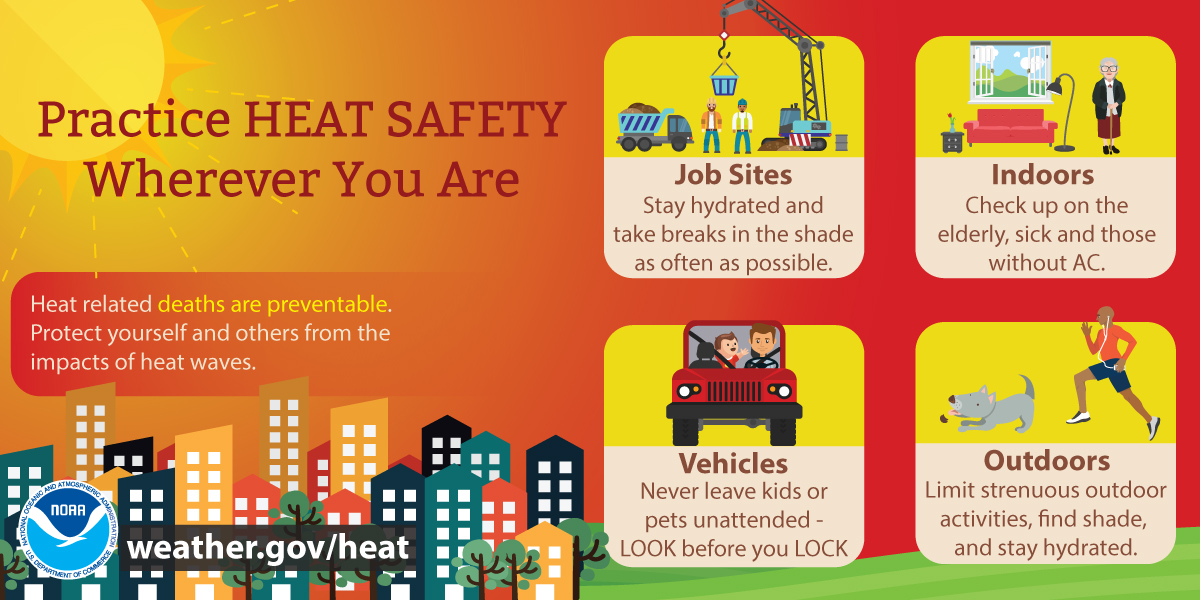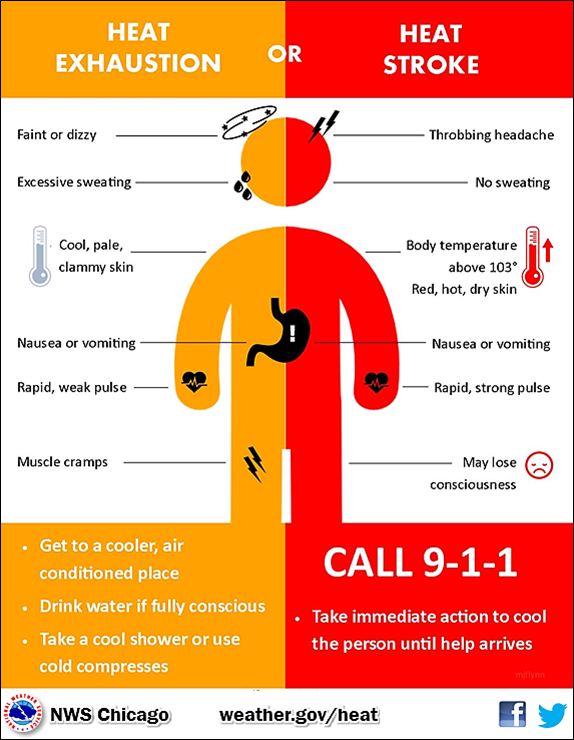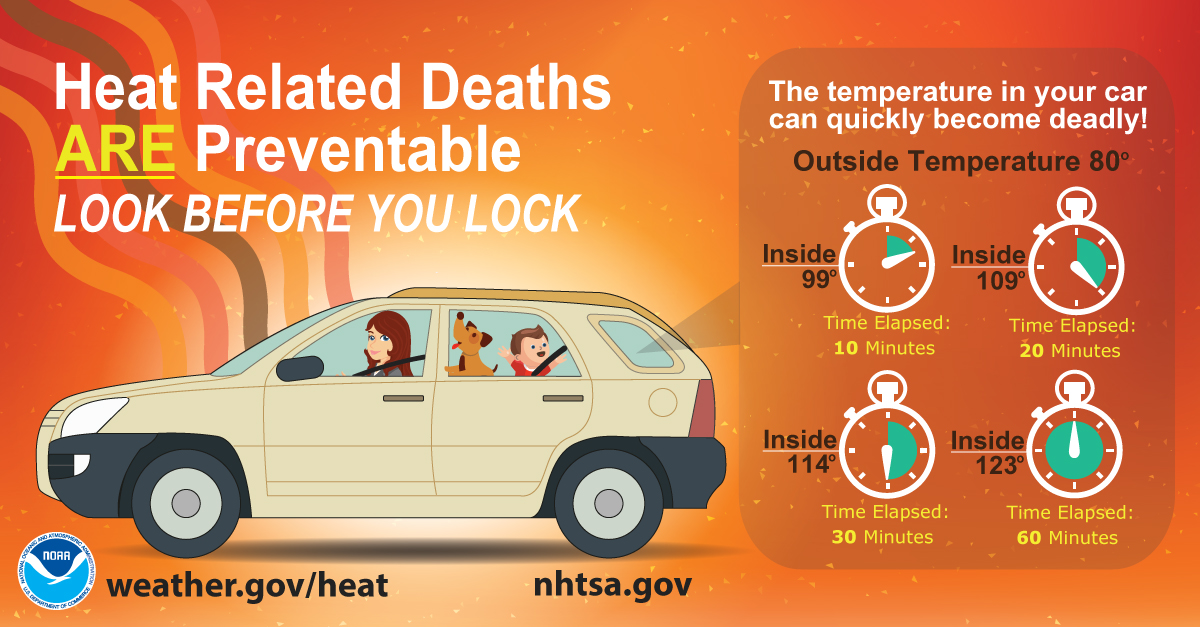Hot Weather Resources
Practice Heat Safety

Stay Cool
- Drink plenty of water.
- Be aware of the signs of heat exhaustion and heat stroke.
- Apply sunscreen regularly.
- Dress in lightweight and light-colored clothing.
- Limit time outside.
- Make sure you have a cool place to shelter from the heat.
- Avoid outdoor activities, especially strenuous activity, during peak heating times of the day.
- If you must work outdoors, work early or very late in the day.
- Stay in an air-conditioned place as much as possible.
- If your home does not have air conditioning, consider visiting the shopping mall or a public library. Even a few hours spent in air conditioning can help your body stay cooler when you return to the heat.
- Remember that electric fans may provide comfort, but when the temperature is in the high 90s, they will not prevent heat-related illness.
- Take a cool shower or bath to cool off.
- Use your stove and oven less to maintain a cooler indoor temperature.
Stay Hydrated
- Drink more fluids, regardless of your level of activity. Don’t wait until you’re thirsty to drink.
- Stay away from very sugary or alcoholic drinks — these actually cause you to lose more body fluid. Also, avoid very cold drinks, because they can cause stomach cramps.
- Heavy sweating removes essential salts and minerals from the body that need to be replenished. A sports drink can help replace the salt and minerals lost in sweat.
Monitor Those at High Risk
Although anyone at any time can suffer from heat-related illness, some people are at greater risk than others:
- Infants and young children
- People 65 years of age or older
- People who are overweight
- People who overexert during work or exercise
- People who are physically ill, especially with heart disease or high blood pressure, or who take certain medications, such as for depression, insomnia, or poor circulation
- Visit adults at risk at least twice a day and closely watch them for signs of heat exhaustion or heat stroke. Infants and young children, of course, need much more frequent watching.
If you are concerned about a loved one's well-being during a period of dangerous heat, contact the Naperville Police Department at (630) 420-6666 to arrange for a non-emergency wellness check.
Heat Exhaustion vs. Heat Stroke
During extremely hot and humid weather, your body's ability to regulate its temperature is challenged. When the body overheats too rapidly to cool itself properly, or when too much fluid or salt is lost through dehydration or excessive sweating, body temperature rises, and you or someone you care about may experience a heat-related illness. The Centers for Disease Control and Prevention (CDC) provides a list of warning signs and symptoms of heat illness, along with recommended first aid steps.

Heat Exhaustion
Symptoms
- Heavy sweating
- Weakness
- Cool, pale, and clammy skin
- Fast and weak pulse
- Possible muscle cramps
- Dizziness
- Nausea or vomiting
- Fainting
First Aid
- Move the person to a cooler environment
- Lay the person down and loosen clothing
- Apply cool, wet cloths to as much of the body as possible
- Fan or move the victim to an air-conditioned room
- Offer sips of water
- If a person vomits more than once, seek immediate medical attention
Heat Stroke
Symptoms
- Altered mental state
- One or more of the following symptoms: throbbing headache; confusion; nausea; dizziness; shallow breathing; body temperature above 103°F; hot, red, or dry moist skin; rapid and strong pulse; fainting; or losing consciousness
First Aid
- Heat stroke is a severe medical emergency. Call 911 or get the victim to a hospital immediately. Delay can be fatal.
- Move the victim to a cooler, preferably air-conditioned, environment.
- Reduce body temperature with cool cloths or a bath.
- Use a fan if heat index temperatures are below the high 90s. A fan can make you hotter at higher temperatures.
- Do NOT give fluids.
For more information, visit the CDC website.
Children, Pets and Vehicles

- NEVER leave a toddler, disabled person or pet locked in a car.
- Cars can quickly heat up to dangerous temperatures, even with a window cracked open. While anyone left in a parked car is at risk, children are especially at risk of getting heat stroke or dying.
- If you have a toddler in your household, lock your cars, even in your own driveway.
- When traveling with children, remember to do the following:
- To remind yourself that a child is in the car, keep a stuffed animal in the car seat. When the child is buckled in, place the stuffed animal in the front with the driver.
- When leaving your car, check to be sure everyone is out of the car. Do not overlook any children who have fallen asleep in the car.
- Dangerously hot weather can be just as deadly to animals.
- Provide ample shade and water.
- Limit time outside and exercise on hot days.
- Be mindful of hot pavement, which can burn your pet's paw pads.
If you see a child or animal in an unattended, parked car, call 911.
